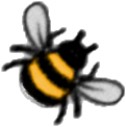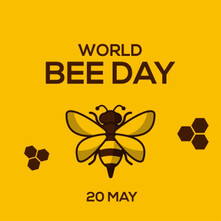"Bee inspired by nature to nourish us all", May 20 2025 World Bee Day 
This year’s celebration on 20 May highlights the vital roles of bees and other pollinators in ensuring global food security and nutrition
Our world would be a very different place without bees and other pollinators! These amazing creatures are vital to our existence, and we owe them so much. Without pollinators, our diets would be very different, and so would our agriculture and biodiversity. Since 2018, World Bee Day has been an occasion to celebrate these tiny miracle workers globally.
In 2025, under the theme "Bee inspired by nature to nourish us all", the World Bee Day celebration will shine light on the vital roles of bees and other pollinators in ecosystem restoration, biodiversity conservation and food security and nutrition.
Why pollinators matter
It is thanks to the over 20 000 bee species and various other wild pollinators that we can produce most of the crops we eat. These range from butterflies through birds and bats to other unsung heroes of pollination such as several species of monkeys, rodents, lemurs, tree squirrels, olingo and kinkajou. In fact, they pollinate 87 out of 115 world's leading food crops. In addition to their contribution to agricultural production, pollinators play an important role as indicators of ecosystem’s health. Their cyclical presence or absence signal changes that affect the entire ecosystem, for instance.
What to expect
This World Bee Day celebration is a unique opportunity to appeal to beekeepers, pollination experts, researchers, policy makers, Indigenous Peoples, industry representatives, civil society organizations and individuals from around the world to:
- Raise awareness – Disseminate information on the importance of bees and other pollinators to food security and nutrition and environmental sustainability.
- Foster collaboration – Establish a "Friends of Bees and Pollinators" network to drive global and local action.
- Promote nature-positive and agroecological approaches – Advocate for pollinator-friendly practices and policies at national and international levels.
- Showcase creativity, traditional knowledge and innovations – Highlight outputs of groundbreaking research, Indigenous Peoples’ knowledge and practices for the conservation and sustainable use of pollinators, and sustainable beekeeping initiatives that support communities and livelihoods.
Together, let’s amplify and reinforce the contributions of bees and other pollinators to resilient agrifood systems and highlight the vital roles of all actors in conserving and sustainably managing them.
The Vital Role of Bees and Pollinators in Our Ecosystem
Bees and other pollinators are indispensable to maintaining healthy ecosystems and ensuring global food security. By facilitating plant reproduction, they support biodiversity and contribute to the production of nutrient-rich food. Unfortunately, modern agricultural practices—such as intensive monoculture and pesticide misuse—threaten pollinators by limiting their food sources, destroying nesting sites, and exposing them to harmful chemicals that weaken their immune systems.
To raise awareness about the importance of pollinators and the urgent challenges they face, the world celebrates World Bee Day annually. Established in 2018 through the efforts of the Slovenian Government and with support from Apimondia, the UN General Assembly officially declared May 20 as World Bee Day. This date honors Anton Janša, a Slovenian pioneer of modern beekeeping, whose legacy continues to shape sustainable beekeeping practices.
The decline in bee populations and other pollinators is alarming, posing a significant threat to global biodiversity and food production. World Bee Day provides a crucial opportunity for governments, organizations, civil society, and individuals to advocate for pollinator protection, restore habitats, and promote sustainable beekeeping practices.
Under the theme “Commit to Bees: For Pollinator-Friendly Agricultural Production,” World Bee Day 2025 urges global action to foster agricultural methods that support pollinators. By implementing evidence-based, sustainable practices, we can secure a future where bees thrive, ensuring both ecological balance and food security for generations to come.

